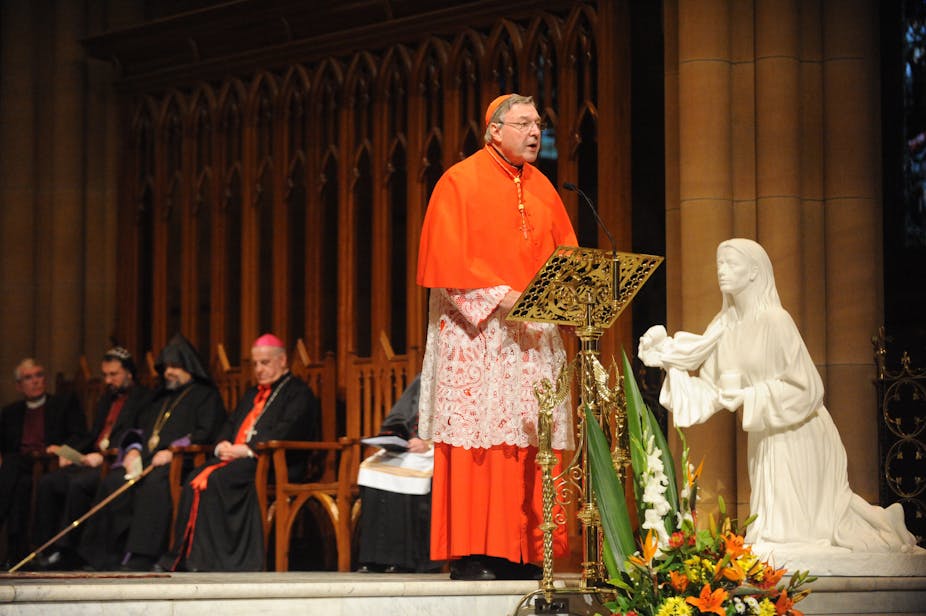Report after damning report is rapidly revealing the dirty secrets of the Catholic Church. As fresh allegations and evidence abound, it seems we have a seismic shift in the battle for justice for victims and their families in relation to clergy sex crimes and their concealment.
As reported on ABC Lateline last week, Detective Chief Inspector Peter Fox of NSW Police wrote to NSW Premier O’Farrell saying that he had “seen the worst society can dredge up, particularly the evil of paedophilia within the Catholic Church”. Fox has worked in the Maitland-Newcastle region of NSW, an area where (like Ballarat in Victoira) paedophile rings of Catholic clergy were allowed to run free.
This claim by Fox is not only damning, but the things it speaks of are repugnant. Children are brutally sodomised and raped; they are beaten and bashed; they are forced to do things to these adult male sexual predators. The minds of these children are so acutely distorted they may never trust again. They are intensely sad, profoundly confused and so filled with terror and fear they are unable to disclose the crimes for many years, if at all.
Too many of these children go on to kill themselves because they can no longer bear the immense suffering. Many others lead troubled and anguished lives where drugs and alcohol momentarily blot out the pain only to re-appear even more aggressively when the drugs wear off. Such a perpetual and horrific cycle, though, seems to keep the survivor alive – at least for another day.
Others may manage better, but not before they invest enormous time, money and effort in their own survival. Detective Chief Inspector Fox also reported irrefutable evidence that the Catholic church “covers up, silences victims, hinders police investigations, alerts offenders, destroys evidence and moves priests to protect the good name of the church”.
Victoria Police recently gave evidence to the Victorian Parliamentary Inquiry into handling of child abuse by religious and other organisations. This evidence alleged that the Catholic Church destroys evidence, tips off offenders, hinders police investigations, moves priests, conceals crimes and causes secondary abuse and trauma to victims in an attempt to protect the good name of the church.
Investigative journalists are inundated with reports of clergy-related sex crimes and their concealment. Hundreds of submissions have been lodged with the Victorian Inquiry with many more of allegations of these sex crimes and their concealment. The sum of the evidence is voluminous, glaring and compelling.
There has been a multitude of calls for a Royal Commission to investigate these vile and vicious crimes that go as high as the prime minister. These calls are coming from victims and their families, priests and lay members of the Catholic church, politicians, academics, lawyers, police, advocates, health professionals and the community at large.
The only opposition to a Royal Commission is from the Catholic Church and government.
Federal and state governments argue that a Royal Commission is too legalistic and adversarial for victims. They argue that lesser forms of inquiry have the same powers as a Royal Commission. They argue that lesser forms of inquiry are well-resourced and independent. These arguments are feeble attempts at a ruse - a ruse worthy of derision.
A Royal Commission has very wide and coercive powers to compel the production of documents and witness attendance, issue search warrants and can punish for contempt.
Parliamentary Inquiries must refer matters of contempt back to the Parliament. And, unlike a Parliamentary Inquiry, once a commission has commenced, it cannot be stopped prematurely by government. A commission is headed by a judge and supported by lawyers and barristers with forensic expertise and experience; it is well-resourced, rigorous, independent and more persuasive than a lesser form of inquiry. For these reasons, a Royal Commission is the only vehicle capable of effectively investigating the Catholic Church’s crimes.
George Cardinal Pell said in this weekend’s Australian that there is insufficient evidence to justify a Royal Commission into the sexual crimes of the Catholic church. How many more allegations and how many more deaths does Pell consider necessary before there is “sufficient” evidence?
Tellingly, Cardinal Pell also said: “anti-Catholic prejudice is one of the few remaining prejudices”. This diversionary comment reveals the true modus operandi of the Cardinal and his office – blaming everything and everyone else for the crimes of the church.
The calls for a Royal Commission are not based on prejudice, rather an ongoing task of trying to get justice for victims and their families.
Cardinal Pell argues he is not the head of the church in Australia, that he is only responsible for the Archdiocese of Sydney. This claim does not cut it with victims, their families and the public. If he can’t stand up as Australia’s Prince of the Church and face the truth, then he must stand down.

